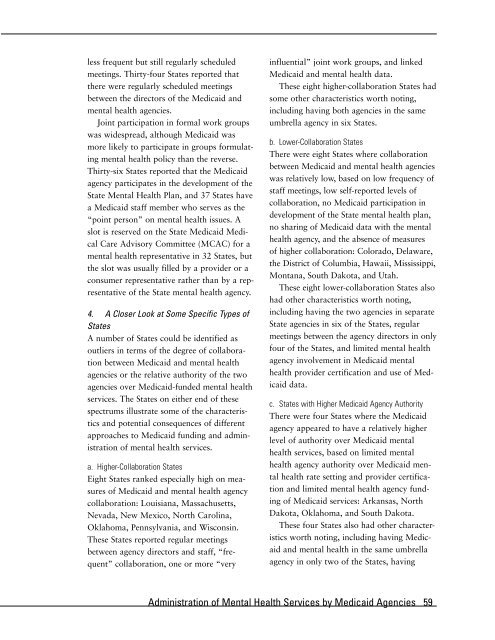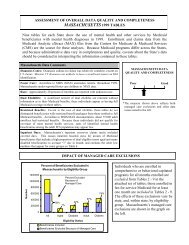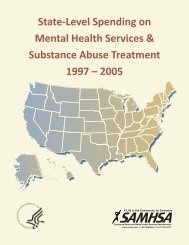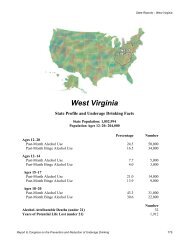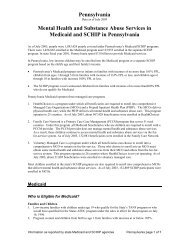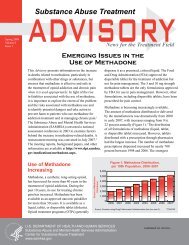Administration of Mental Health Services by Medicaid Agencies
Administration of Mental Health Services by Medicaid Agencies
Administration of Mental Health Services by Medicaid Agencies
Create successful ePaper yourself
Turn your PDF publications into a flip-book with our unique Google optimized e-Paper software.
less frequent but still regularly scheduledmeetings. Thirty-four States reported thatthere were regularly scheduled meetingsbetween the directors <strong>of</strong> the <strong>Medicaid</strong> andmental health agencies.Joint participation in formal work groupswas widespread, although <strong>Medicaid</strong> wasmore likely to participate in groups formulatingmental health policy than the reverse.Thirty-six States reported that the <strong>Medicaid</strong>agency participates in the development <strong>of</strong> theState <strong>Mental</strong> <strong>Health</strong> Plan, and 37 States havea <strong>Medicaid</strong> staff member who serves as the“point person” on mental health issues. Aslot is reserved on the State <strong>Medicaid</strong> MedicalCare Advisory Committee (MCAC) for amental health representative in 32 States, butthe slot was usually filled <strong>by</strong> a provider or aconsumer representative rather than <strong>by</strong> a representative<strong>of</strong> the State mental health agency.4. A Closer Look at Some Specific Types <strong>of</strong>StatesA number <strong>of</strong> States could be identified asoutliers in terms <strong>of</strong> the degree <strong>of</strong> collaborationbetween <strong>Medicaid</strong> and mental healthagencies or the relative authority <strong>of</strong> the twoagencies over <strong>Medicaid</strong>-funded mental healthservices. The States on either end <strong>of</strong> thesespectrums illustrate some <strong>of</strong> the characteristicsand potential consequences <strong>of</strong> differentapproaches to <strong>Medicaid</strong> funding and administration<strong>of</strong> mental health services.a. Higher-Collaboration StatesEight States ranked especially high on measures<strong>of</strong> <strong>Medicaid</strong> and mental health agencycollaboration: Louisiana, Massachusetts,Nevada, New Mexico, North Carolina,Oklahoma, Pennsylvania, and Wisconsin.These States reported regular meetingsbetween agency directors and staff, “frequent”collaboration, one or more “veryinfluential” joint work groups, and linked<strong>Medicaid</strong> and mental health data.These eight higher-collaboration States hadsome other characteristics worth noting,including having both agencies in the sameumbrella agency in six States.b. Lower-Collaboration StatesThere were eight States where collaborationbetween <strong>Medicaid</strong> and mental health agencieswas relatively low, based on low frequency <strong>of</strong>staff meetings, low self-reported levels <strong>of</strong>collaboration, no <strong>Medicaid</strong> participation indevelopment <strong>of</strong> the State mental health plan,no sharing <strong>of</strong> <strong>Medicaid</strong> data with the mentalhealth agency, and the absence <strong>of</strong> measures<strong>of</strong> higher collaboration: Colorado, Delaware,the District <strong>of</strong> Columbia, Hawaii, Mississippi,Montana, South Dakota, and Utah.These eight lower-collaboration States alsohad other characteristics worth noting,including having the two agencies in separateState agencies in six <strong>of</strong> the States, regularmeetings between the agency directors in onlyfour <strong>of</strong> the States, and limited mental healthagency involvement in <strong>Medicaid</strong> mentalhealth provider certification and use <strong>of</strong> <strong>Medicaid</strong>data.c. States with Higher <strong>Medicaid</strong> Agency AuthorityThere were four States where the <strong>Medicaid</strong>agency appeared to have a relatively higherlevel <strong>of</strong> authority over <strong>Medicaid</strong> mentalhealth services, based on limited mentalhealth agency authority over <strong>Medicaid</strong> mentalhealth rate setting and provider certificationand limited mental health agency funding<strong>of</strong> <strong>Medicaid</strong> services: Arkansas, NorthDakota, Oklahoma, and South Dakota.These four States also had other characteristicsworth noting, including having <strong>Medicaid</strong>and mental health in the same umbrellaagency in only two <strong>of</strong> the States, having<strong>Administration</strong> <strong>of</strong> <strong>Mental</strong> <strong>Health</strong> <strong>Services</strong> <strong>by</strong> <strong>Medicaid</strong> <strong>Agencies</strong> 59


